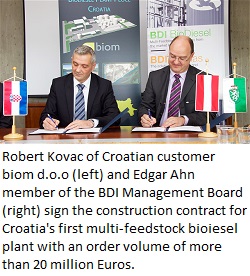The Solar Power International 2013 tradeshow is kicking off October 21-24, 2013 and as solar companies gear up to showcase their technologies, Kyocera Solar is showcasing their latest solar project at the Chicago Midway Airport. Twenty-five kilowatts (kW) of Kyocera photovoltaic modules now help power Chicago’s Midway Airport’s new  environmentally friendly consolidated rental car facility. Installed by Green Power Solutions, the PV system is on the roof of the Quick-Turn Around (QTA) facility, where hundreds of rental cars are washed and refueled daily.
environmentally friendly consolidated rental car facility. Installed by Green Power Solutions, the PV system is on the roof of the Quick-Turn Around (QTA) facility, where hundreds of rental cars are washed and refueled daily.
As planes taxi and land, passengers now enjoy a view of the rooftop PV system, which supplies about 30 percent of the QTA’s power needs and provides a strong visual reminder of Midway Airport’s green initiatives. The QTA facility includes nine car wash bays, nine fueling islands, 36 fuel pumps and two 20,000 gallon underground fuel tanks. Water used to wash the rental cars is recycled.
“We’re excited to be a part of Midway Airport’s ‘greening,’ and hope this installation serves as a high-profile reminder that solar power is the smart choice for our nation’s future,” said Steve Hill, president, Kyocera Solar Inc. “With 38 years of solar industry experience, Kyocera is committed to providing reliable products that will help our nation’s municipalities leverage the clean, renewable energy of the sun for decades to come.”
 Working together, Kyocera and Green Power Solutions were able to overcome a structural challenge with the installation, which sits on a split-seam metal roof, by modifying a special clamp on the racking system to secure the system in place. Green Power Solutions also installed nine wind turbines in conjunction with Midway Airport’s green initiative. The Chicago Department of Aviation (CDA) is pursuing LEED certification for the project, which receives three “green airplanes” for design and four green airplanes for construction, as rated by the CDA’s Sustainable Airport Manual.
Working together, Kyocera and Green Power Solutions were able to overcome a structural challenge with the installation, which sits on a split-seam metal roof, by modifying a special clamp on the racking system to secure the system in place. Green Power Solutions also installed nine wind turbines in conjunction with Midway Airport’s green initiative. The Chicago Department of Aviation (CDA) is pursuing LEED certification for the project, which receives three “green airplanes” for design and four green airplanes for construction, as rated by the CDA’s Sustainable Airport Manual.
“We chose Kyocera because of its high-quality, reliable solar modules in addition to the strong engineering support they provided, which helped streamline the installation,” added Steve Arwady of Green Power Solutions. “We received expert, hands-on solutions from Kyocera, which tipped the balance when we compared panel for panel at almost the same price. We chose Kyocera, the company that gave us the best service. We intend to partner with them on future projects.”
In addition to the Midway airport project, Tucson International Airport recently wrapped up the first phase of a 2.5 megawatt (MW) solar canopy installation using Kyocera polycrystalline silicon modules above the main public parking lot. Completed in August, the 1MW section powers about a third of the terminal complex’s power needs.
 The nation’s capitol is “so quiet you can hear a pin drop” but the American Petroleum Institute (API) is still working to beat the Renewable Fuel Standard (RFS), and the government shutdown means E15 retailers are unable to get approval.
The nation’s capitol is “so quiet you can hear a pin drop” but the American Petroleum Institute (API) is still working to beat the Renewable Fuel Standard (RFS), and the government shutdown means E15 retailers are unable to get approval.  Dinneen also talks about the API lawsuit filed this week over the volume requirements of the RFS and the possibility that the government shut down would dely EPA’s release of the 2014 Renewable Volume Obligation (RVO), due out next month. “But this year, EPA took far too long to get those out,” he said, noting the numbers were just released in August – nine months late without a government shut down. “You want those numbers out as early as possible so the marketplace can respond.”
Dinneen also talks about the API lawsuit filed this week over the volume requirements of the RFS and the possibility that the government shut down would dely EPA’s release of the 2014 Renewable Volume Obligation (RVO), due out next month. “But this year, EPA took far too long to get those out,” he said, noting the numbers were just released in August – nine months late without a government shut down. “You want those numbers out as early as possible so the marketplace can respond.” 










